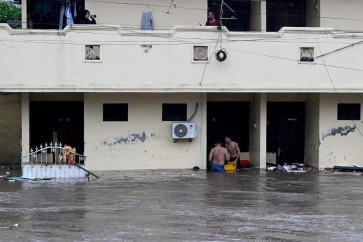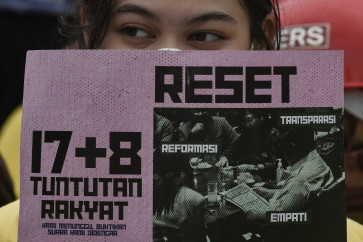Popular Reads
Top Results
Can't find what you're looking for?
View all search resultsPopular Reads
Top Results
Can't find what you're looking for?
View all search resultsPushing their limits
Retired three-time Olympic swimmer and triathlete Richard Sam Bera recalls that only fi ve Indonesians participated in the 2009 Bintan Triathlon
Change text size
Gift Premium Articles
to Anyone
R
etired three-time Olympic swimmer and triathlete Richard Sam Bera recalls that only fi ve Indonesians participated in the 2009 Bintan Triathlon. Last year, more than 100 competed in the individual races alone.
Triathlons are rapidly finding devotees among men and women of all ages. Despite its arduous combination of longdistance swimming, cycling and running, the triathlon can attract even those who otherwise do little sport.
'If you can swim and bike or are willing to learn, can walk or roll a wheelchair, you can do the triathlon,' says Arsiyanti Ardie, a marketing consultant who fi rst competed in the 2005 UCLA IronBruin Triathlon in Los Angeles, a benefit for the US Challenged Athletes Foundation.
'I got to see athletes who were blind, amputees, deaf or had some other type of diffi culty who were taking on the very same challenge of triathlon as everyone else.'
Anyone willing to believe it possible can join in the fun ' doing the triathlon really is that accessible. It's social as well, with training partners joining forces to test each other's limits.
Take Yoanita Tahalele, a young mother and fashion blogger who confesses to having had no interest in sports in the past. In June, she impressed not only herself but also everyone she knows when she crossed the fi nish line at the 2013 Bali International Triathlon.
'Doing a triathlon appealed to me because I love adventure, and the fact that it consists of three sports challenged me to stick at it,' says Yoanita, who began her intensive training just a month before the competition and paired up with her older sister Miranda for the Olympic Distance relay race, swimming 1.5 kilometers in open water.
'The atmosphere of the race was amazing,' she adds. 'Adrenaline was pumping the whole time. I'm defi nitely going to do more triathlons in the future.' As triathletes often say, 'do one and you'll be hooked'. What makes it addictive is the combination of the adrenaline before the race, the pain and persistence during it, and the joy of crossing the finish line.
'Every time I do a race, I look for another triathlon with a new target,' says Miranda.
'If I didn't do triathlons, I might not be motived to work out. Because once you get started, exercise becomes part of your daily routine and being healthy becomes part of your lifestyle.'
Going the Distance
Triathlons cover various distances; the most common are the 'Sprint' (750 m swim, 20 km bicycle and 5 km run) and the 'Olympic Distance' (1.5 km swim, 40 km bicycle and 10 km run).
Competitors are divided into pro athletes and age groupers, so amateurs race against others of the same sex and age.
Beginners may like to start by taking a relay approach. In the relay format, two or three individuals make a team, with each one doing only one or two of the sports. For fi rst time racers, being part of a relay team can be a great introduction to a real triathlon.
Silvia Wiratama, a fi nance manager, teamed up with a friend for her fi rst event, the 2012 Bintan Triathlon. 'I performed below my average training speed, but I was really happy to complete my fi rst triathlon,' she says.
Seasoned triathlete MC, shown in the main photo on the opposite page, joined a relay team as the runner for his fi rst triathlon.
'I was a casual mountain biker and had not done any swimming or running since leaving school,' he recalls. 'It was only a 5 km run but I hurt for days afterward.'
MC returned the following year to complete the individual triathlon.
'Satisfied is an understatement,' he says. 'I felt like I had been through an epic disaster and survived. The feel-good factor on your fi rst race is amazing. I couldn't stop grinning for weeks.'
MC now uses triathlons to keep fit. He has moved on, having taken part in the 2012 Ironman World Championship.
Consistent and focused training lies behind any good performance. In Jakarta, the climate, pollution, traffi c, road conditions and limited training facilities actually make competitors tougher. Indeed, some relish it.
'I thrive on the adversity and proving the impossible is possible,' MC says. 'Jakarta defi nitely gives you an edge in mental toughness.'
Although gyms offer a safe environment, many competitors still head outdoors when training. Within the city limits, Ragunan Zoo, Senayan Stadium and the CBD on car-free Sundays are popular places to train.
Others get more creative, notes Harki Apri Yanto, co-founder of Triathlon Buddies (Tri-Buds), a Jakarta-based triathlon community founded in 2012 that has since expanded to several other cities. 'We also practice in Bumi Serpong Damai City or Sentul City for longer runs and bike rides and take a boat out to Pulau Seribu for open water swim practice,' he says.
The Finish Line
Experienced triathletes add that when training and competing, it's important to keep your eye on the prize ' which is whatever you want it to be.
Miranda, who was named the Indonesian Best Female Athlete at the 2012 Bali International Triathlon, suggests competitors set a target carefully.
'It's important to make the target sensible and realistic,' she says. 'Otherwise you'll get stressed out with all the preparation and training.'
Or as Richard puts it, 'Doing a triathlon is about finishing the race, not beating your time. Whatever your physical condition, just fi nishing a triathlon is an achievement.'
Indeed, for Richard, part of the fun of a triathlon is talking about it.
'The greatest thing about doing triathlons is that I can tell everyone I know about the lifestyle and the fun of the sport,' says Richard, who has been sharing his triathlon experiences through Facebook and Twitter since 2008. 'I want to hear more people saying, 'Hey, I've done a triathlon!' as something they can be proud of.'
Sharing experiences and tips throughout the community is another enjoyable part of the sport, says Arsiyanti, who has found triathletes to be among the most fun, generous and passionate people she knows.
'I keep passing on what was given to me now through coaching as well,' she says. 'I am going to be coaching two Indonesian athletes to compete at the 2016 Paralympics in Rio de Janeiro in triathlon, which is a new sport to the Paralympics.'
Arsiyanti brings to her coaching her resilience and persistence, proven by her participation in the 2013 Ironman Japan, in which she recorded one of the fastest swimming times for female competitors ' faster, even, than the triathlon winner.
During the cycling leg, Arsiyanti lost valuable time because of three serious accidents ' yet she still completed it.
'I was close to the cutoff time but just kept going. I got to the bike fi nish two minutes after the cutoff,' she says.
'But I'm still determined to become Indonesia's fi rst Iron Lady when I'm ready to train and race another triathlon again.' For Miranda, however, her personal goal is just to get better each time. 'Achieving my best and improving my performance are all that matter to me now.'
Training tips
Experienced triathletes share their experiences to maximize triathlon training.
'¢ Start slowly and gradually build up to the triathlon event you want to do. What is most important is to just get moving.
'¢ The longer the preparation for a triathlon, the better. First timers should spend 3'5 months in training.
'¢ Connect with a triathlon community on Facebook and join their regular training sessions.
'¢ Treat triathlon as a single race with three components: swimming, running and cycling. It is essential to training in each sport in a week. For example: swim today, cycle the next day and run the day after.
'¢ Try to do one sport each day depending on how much time you have. You should aim for at least 30 minutes swimming, one hour biking and 30 minutes running. Busy people with limited training time would do well to train in a gym during the week. Combine this with outdoor training on the weekend for some healthy socializing time.
'¢ When training for your fi rst individual triathlon, make sure that, at least once in your training period, you can do each leg non-stop. A couple of weeks before the race, do several simulations of the entire race. If you can complete all the stages of the race at your own pace, then you are ready to do the real triathlon.
'¢ Don't bother wasting money on triathlon gear: 'the engine' ' your body ' is more important.
'¢ Do not worry about anything but doing your best. Whatever your excuses to other people, you cannot fool yourself.
'¢ Doing a triathlon has a huge mental component and you need to deal with it. Break it down and work on it in manageable chunks. But no matter how hard it gets, you will smile when you have crossed the finish line.
'¢ Train consistently and do not give up. Find the determination to succeed and you will, and it will be incredibly satisfying. Your self-confi dence will also grow.
'¢ Keep it fun! Enjoy your training and triathlons. Do not force yourself to do anything you find distressing. Keep it in perspective. Triathlon is just a sport.











